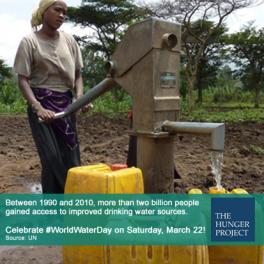 Our lives depend on water. Every day in the developed world, this fact is taken for granted. In general, one has to walk only as far as the kitchen or bathroom taps to access clear water, safe from disease and pollutants. This is why water storage containers are vital for people who do not have access to such luxuries. . It would definitely save local residents a lot of time when it comes to walking back and forth to collect water. Plus, they would be able to transport the water between homes. The issues that many people face is the lack of the water supply. From storing the water securely in containers, there would be water to last families longer than usual. It would be one less aspect to think about.
Our lives depend on water. Every day in the developed world, this fact is taken for granted. In general, one has to walk only as far as the kitchen or bathroom taps to access clear water, safe from disease and pollutants. This is why water storage containers are vital for people who do not have access to such luxuries. . It would definitely save local residents a lot of time when it comes to walking back and forth to collect water. Plus, they would be able to transport the water between homes. The issues that many people face is the lack of the water supply. From storing the water securely in containers, there would be water to last families longer than usual. It would be one less aspect to think about.
In the countries where The Hunger Project (THP) works, the picture looks very different. There is little access to latrine facilities and safe water supplies. Even when improved sources of water exist, they are often more than 30 minutes away and require women and girls to travel there several times a day to obtain the amount of water necessary for their families to drink, bathe with, grow food or raise livestock.
Access to clean and safe drinking water and adequate sanitation saves children’s lives, enables girls to return to school (because they are not traveling far distances each day to retrieve water), and empowers people to lead healthy and productive lives.
Every spring, The Hunger Project celebrates World Water Day on March 22. Throughout The Hunger Project’s programs in Africa, South Asia and Latin America, we empower our village partners to increase their access to clean water and improved sanitation, develop new water resources and implement water conservation techniques.
Clean Water Progress:
- In 2013, The Hunger Project-Bangladesh installed new or rehabilitated 1,161 sanitary latrines.
- 360 tube wells were tested for arsenic by The Hunger Project in Bangladesh last year.
- In our 11 Africa program countries, The Hunger Project provided 158 new or rehabilitated water sources for our partners in 2013.
- 1,811 latrines were installed or rehabilitated in households and public places throughout our program countries in Africa in 2013.
- Over 6,470 women and men completed Water, Environment and Sanitation trainings in The Hunger Project Africa program countries in 2013.
Join us in ensuring safe drinking water and adequate sanitation by investing now.
Learn More:
- [VIDEO] Rainwater Harvesting in Oaxaca, Mexico
- Partners share their experience working with The Hunger Project-Mexico to implement a rainwater harvesting program in their community.
- Water and Sanitation
- Epicenter Community Provides Safe Water to 6,000 Villagers
- Safe Drinking Water Alleviates Worry for Epicenter Community
- Clean Water from Epicenter Borehole Unites Community of Women
